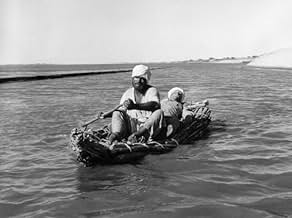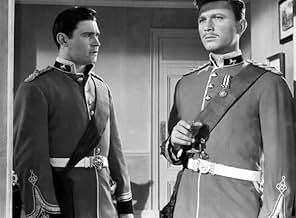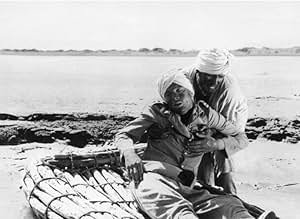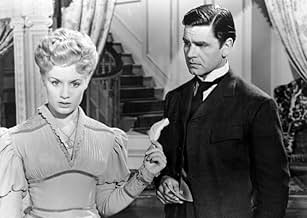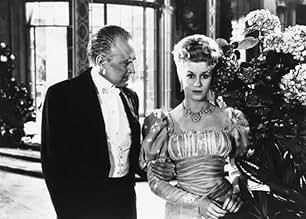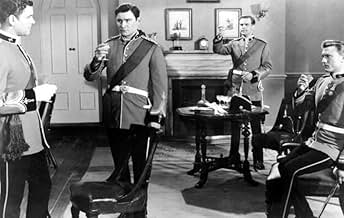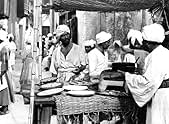अपनी भाषा में प्लॉट जोड़ेंA British officer resigns his commission on the eve of his regiment's departure for war in Sudan. Accused of cowardice by his friends and the woman he loves, he sets out to prove his courage... सभी पढ़ेंA British officer resigns his commission on the eve of his regiment's departure for war in Sudan. Accused of cowardice by his friends and the woman he loves, he sets out to prove his courage to them. A remake of "The Four Feathers" (1939).A British officer resigns his commission on the eve of his regiment's departure for war in Sudan. Accused of cowardice by his friends and the woman he loves, he sets out to prove his courage to them. A remake of "The Four Feathers" (1939).
फ़ीचर्ड समीक्षाएं
This is a remake of the classic 1930' s movie The Four Feathers ,with directorial chores being split between Terence Young ( soon to be a James Bond helmsman) and Zoltan Korda ,whose brother Alexander produced the earlier version The movie is faithful both to the earlier picture and the source novel by A E W Mason .It tells how Harry Faversham is unjustly accused of cowardice when resigning his commission in the British army on the eve of the war in the Sudan against the Mahdi (For a fuller cinema treatment of the conflict see the Heston -Olivier picture "Khartoum ") 3 of his friends and his fiancée hand him white feathers ,emblematic of cowardice .Faversham disappears from London society and travels to Africa and disguises himself as a native ,in which role he comes to the aid of one of his accusers
Their is a slightly cheapskate air about the production whose battle scenes are largely taken from footage shot for the earlier movie .The acting is pretty wooden -espaecially from Anthony as Faversham and Laurence Harvey as his chief accuser .The peppy cameo from James Robertson Justice as a crusty old general adds needed vigour to the acting department as does a pre Hammer movies Christopher Lee as a native tribesman The movie is not downright bad but it lacks the brio and pace that would have lifted it a notch or two higher and overall is competent but slightly plodding
Their is a slightly cheapskate air about the production whose battle scenes are largely taken from footage shot for the earlier movie .The acting is pretty wooden -espaecially from Anthony as Faversham and Laurence Harvey as his chief accuser .The peppy cameo from James Robertson Justice as a crusty old general adds needed vigour to the acting department as does a pre Hammer movies Christopher Lee as a native tribesman The movie is not downright bad but it lacks the brio and pace that would have lifted it a notch or two higher and overall is competent but slightly plodding
Being something of a pacifist, Harry Faversham (Anthony Steele) has the misfortune to be born into a staunchly military family with all the expectations of an overbearing father (Michael Hordern) weighing down on his shoulders. Harry toes the line to please his dad, but when the old boy pops his clogs, he swiftly resigns his commission. As a consequence, he receives a white feather (the symbol of cowardice) from each of his best friends (Laurence Harvey, Ronald Lewis, and an out-of-place Ian Carmichael) on the eve of their departure to war in the Sudan. Harry awards himself a symbolic feather on behalf of his fiancée (Mary Ure) whose disappointment is clear. Harry determines to make his former friends take back their feathers, which is the signal for much derring-do to begin (hurrah!).
The tale of the four feathers is the epitome of the schoolboy adventure yarn with heroic soldiers blinded in battle, heroic soldiers captured by the fuzzie-wuzzies (not nice, I can tell you!), heroic cowards braving forehead-branding and boot polish to go deep under cover in darkest Africa, and pompous old boors endlessly recounting their role in the battle of Balaclava back in the Crimean. It should really be boredom-proof, but the sad truth is that this version comes perilously close to inducing that state at times. The film is practically a word-for-word remake of the 1939 version – and even makes scandalously wholesale use of the earlier version's battle scenes – which means it probably came across as a bit staid back in 1955, but looks positively creaky today.
Anthony Steel isn't a particularly convincing hero: at thirty-five he's playing a twenty-five year old who somehow looks forty-five, but the problem is more in the lack of sympathy Steel creates for his character. His Harry Faversham is the sort that sits in the corner and speaks when he's spoken too, and is therefore a little too bland to be a dashing hero, despite his acts of heroism. And exactly what sort of reaction did he expect to receive when he resigned his commission? Doesn't trotting off to the desert to regain his honour in the eyes of his friends and fiancée simply negate the strength of character required to resign in the first place? A young Laurence Harvey fares better as Faversham's upper-crust chum who suffers sun blindness when hiding from the fuzzies, and would arguably have been better suited to the leading man role. Ronald Lewis has practically nothing to do, while Ian Carmichael, on the cusp of his comedy career, comes off as a plummy-voiced twit.
The film isn't awful by any standards, but it really could have benefited from fifteen minutes being pruned from its running time, and a little more fire in young Faversham's belly.
The tale of the four feathers is the epitome of the schoolboy adventure yarn with heroic soldiers blinded in battle, heroic soldiers captured by the fuzzie-wuzzies (not nice, I can tell you!), heroic cowards braving forehead-branding and boot polish to go deep under cover in darkest Africa, and pompous old boors endlessly recounting their role in the battle of Balaclava back in the Crimean. It should really be boredom-proof, but the sad truth is that this version comes perilously close to inducing that state at times. The film is practically a word-for-word remake of the 1939 version – and even makes scandalously wholesale use of the earlier version's battle scenes – which means it probably came across as a bit staid back in 1955, but looks positively creaky today.
Anthony Steel isn't a particularly convincing hero: at thirty-five he's playing a twenty-five year old who somehow looks forty-five, but the problem is more in the lack of sympathy Steel creates for his character. His Harry Faversham is the sort that sits in the corner and speaks when he's spoken too, and is therefore a little too bland to be a dashing hero, despite his acts of heroism. And exactly what sort of reaction did he expect to receive when he resigned his commission? Doesn't trotting off to the desert to regain his honour in the eyes of his friends and fiancée simply negate the strength of character required to resign in the first place? A young Laurence Harvey fares better as Faversham's upper-crust chum who suffers sun blindness when hiding from the fuzzies, and would arguably have been better suited to the leading man role. Ronald Lewis has practically nothing to do, while Ian Carmichael, on the cusp of his comedy career, comes off as a plummy-voiced twit.
The film isn't awful by any standards, but it really could have benefited from fifteen minutes being pruned from its running time, and a little more fire in young Faversham's belly.
A tepid remake of their spectacular 1939 version, one wonders what the Korda's where thinking. Indeed much of the location footage is recycled directly from the 1939 film including the whole final battle, aside from some closeups of the 1955 actors. Mildly entertaining, but the 1939 version is better, much much better.
If the name The Sudan is familiar today it is probably on account of the constant references to the exploits of his youth by Jonesy in 'Dad's Army' of the time he spent engaging the Mad Mahdi, briefly seen played by John Laurie in footage from the 1939 version.
Here you get a chance to see the thing played straight in this CinemaScope remake by Zoltan Korda of his classic thirties Ripping Yarn back in the days when Britain still had an empire.
Anthony Steel is a colourless substitute for John Clements as Harry Faversham and the less said about Lawrence Harvey in the role originally played by Ralph Richardson the better; but the late Mary Ure makes a charming and gracious heroine, while Osmond Borradaile's original location footage continued to give good value in this and a subsequent seventies version.
Here you get a chance to see the thing played straight in this CinemaScope remake by Zoltan Korda of his classic thirties Ripping Yarn back in the days when Britain still had an empire.
Anthony Steel is a colourless substitute for John Clements as Harry Faversham and the less said about Lawrence Harvey in the role originally played by Ralph Richardson the better; but the late Mary Ure makes a charming and gracious heroine, while Osmond Borradaile's original location footage continued to give good value in this and a subsequent seventies version.
A lot of critics gave this movie a really hard time. I never read critical reviews until I've seen a film and I must confess that I thoroughly enjoyed this one. Maybe it did use footage from a previous shoot and there were certainly flaws. But all in all, this was a good schoolboy yarn. I liked the lengthy build up to the scenes in Sudan, it really helped set the scene and made you care about the characters. The plot lingered long enough to give the viewer a feel of the longevity of the piece. The plot was well moved along and there was suitable emotion shown. James Robertson Justice so often just barks out his lines and in this movie he....Well, just barked out his lines! A real shame. A small blemish on an otherwise enjoyable movie.
क्या आपको पता है
- ट्रिवियाRe-used a great deal of stock footage from The Four Feathers (1939), including the entire final battle sequence.
- गूफ़Hooded vultures are shown making many and various calls. The species, in common with other Old World vultures, is largely silent.
- क्रेज़ी क्रेडिटOpening credits prologue: In 1885 the rebellious army of dervishes enslaved and killed many thousands of defenceless natives in the Sudan. Then laid siege to Khartoum. The scanty garrison's heroic commander, General Gordon appealed for help from England - but no help reached him.
- कनेक्शनEdited from The Four Feathers (1939)
टॉप पसंद
रेटिंग देने के लिए साइन-इन करें और वैयक्तिकृत सुझावों के लिए वॉचलिस्ट करें
- How long is Storm Over the Nile?Alexa द्वारा संचालित
विवरण
- रिलीज़ की तारीख़
- कंट्री ऑफ़ ओरिजिन
- भाषा
- इस रूप में भी जाना जाता है
- Zoltan Korda's Production Storm Over the Nile
- फ़िल्माने की जगहें
- उत्पादन कंपनियां
- IMDbPro पर और कंपनी क्रेडिट देखें
- चलने की अवधि1 घंटा 47 मिनट
- पक्ष अनुपात
- 2.55 : 1
इस पेज में योगदान दें
किसी बदलाव का सुझाव दें या अनुपलब्ध कॉन्टेंट जोड़ें


